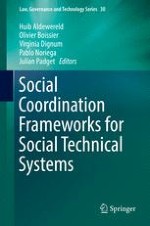2016 | OriginalPaper | Buchkapitel
10. Specifying and Executing Open Multi-agent Systems
verfasst von : Alexander Artikis, Marek Sergot, Jeremy Pitt, Dídac Busquets, Régis Riveret
Erschienen in: Social Coordination Frameworks for Social Technical Systems
Aktivieren Sie unsere intelligente Suche, um passende Fachinhalte oder Patente zu finden.
Wählen Sie Textabschnitte aus um mit Künstlicher Intelligenz passenden Patente zu finden. powered by
Markieren Sie Textabschnitte, um KI-gestützt weitere passende Inhalte zu finden. powered by
